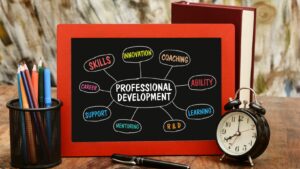In today’s competitive job market, investing in professional development assistance is crucial for staying ahead. Whether it’s honing new skills, expanding knowledge, or navigating career transitions, having the right support can make all the difference. Professional development assistance offers tailored guidance to help individuals reach their career goals efficiently.
Companies that prioritize professional development assistance empower their employees to grow and adapt to the ever-evolving demands of the workplace. By offering resources such as mentorship programs, training workshops, and educational opportunities, organizations foster a culture of continuous learning and improvement. This not only benefits the individual employee but also contributes to the overall success and innovation of the company.
Professional Development Assistance
Why Continuous Learning Matters
 Continuous learning is crucial in today’s fast-paced work environment. It allows individuals to stay updated with the latest industry trends, technologies, and best practices. By constantly acquiring new knowledge and skills, professionals can adapt to changing job requirements and remain competitive in their fields. Employers increasingly value employees who demonstrate a commitment to lifelong learning, as it shows a proactive approach to personal and professional growth.
Continuous learning is crucial in today’s fast-paced work environment. It allows individuals to stay updated with the latest industry trends, technologies, and best practices. By constantly acquiring new knowledge and skills, professionals can adapt to changing job requirements and remain competitive in their fields. Employers increasingly value employees who demonstrate a commitment to lifelong learning, as it shows a proactive approach to personal and professional growth.
Benefits for Employees and Employers
Professional development assistance offers several benefits for both employees and employers. For employees, it provides opportunities to enhance their skills, increase job satisfaction, and boost career prospects. Continuous learning can result in higher job performance, increased confidence, and a sense of accomplishment. Employers benefit from improved employee engagement, retention, and productivity. Investing in professional development assistance can lead to a more skilled and motivated workforce, contributing to the overall success of the organization.
Types of Professional Development Assistance
Training Programs
 Training programs are structured learning initiatives designed to enhance specific skills or knowledge areas. These programs provide employees with the opportunity to improve their expertise in areas relevant to their roles. Employers often offer a variety of training options, including in-person workshops, online courses, and seminars. By participating in these programs, individuals can stay updated on industry best practices, boost their job performance, and increase their value within the organization.
Training programs are structured learning initiatives designed to enhance specific skills or knowledge areas. These programs provide employees with the opportunity to improve their expertise in areas relevant to their roles. Employers often offer a variety of training options, including in-person workshops, online courses, and seminars. By participating in these programs, individuals can stay updated on industry best practices, boost their job performance, and increase their value within the organization.
Mentorship Opportunities
Mentorship opportunities involve pairing experienced professionals with less experienced individuals to provide guidance, support, and career advice. Through mentorship, employees can benefit from the wisdom and expertise of their mentors, gaining insights into navigating career challenges, honing their skills, and expanding their professional network. Mentorship programs foster a culture of knowledge sharing and growth within the organization, leading to improved job satisfaction and increased retention rates.
Educational Reimbursements
Educational reimbursements refer to financial support provided by employers to help employees pursue further education or training. This assistance may cover tuition fees, books, or other educational expenses incurred by the employee. By offering educational reimbursements, employers encourage continuous learning and skill development among their workforce. This benefit not only enhances the knowledge base of employees but also demonstrates the organization’s commitment to investing in the growth and development of its staff.
Evaluating Program Effectiveness
 Assessing the effectiveness of a professional development program is crucial to ensure that it meets expectations and provides tangible benefits.
Assessing the effectiveness of a professional development program is crucial to ensure that it meets expectations and provides tangible benefits.
- Learning Outcomes: The program’s learning objectives and outcomes to determine if they align with the skills and knowledge you aim to acquire. Clear and measurable outcomes indicate a well-structured program.
- Participant Feedback: Seek feedback from past participants to gauge their satisfaction and the impact of the program on their professional growth. Testimonials and recommendations can provide valuable insights into the program’s effectiveness.
- Career Impact: Evaluate how the program has influenced the career paths and opportunities of previous participants. Look for success stories, promotions, or new job placements resulting from completing the program.
- Resources and Support: Consider the support and resources offered during the program, such as access to mentors, career counseling, or networking opportunities. These additional features can enhance the overall effectiveness of the program.
- Continuous Improvement: Look for programs that demonstrate a commitment to continuous improvement and updates to ensure relevance and quality. Programs that evolve with industry trends and feedback are more likely to deliver lasting benefits.

